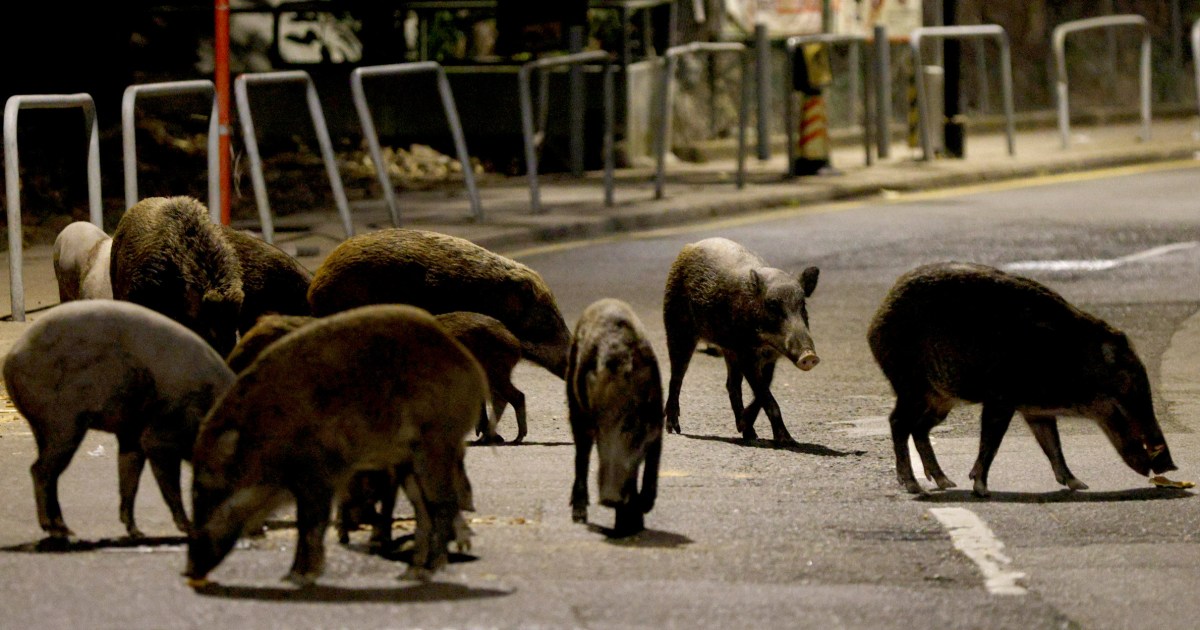
HONG KONG — They’ve taken subway rides, loitered at pedestrian crossings and been fed by local residents. But now wild boars have finally gone a step too far for authorities in Hong Kong.
Increasing incidents involving the animals, which have long roamed the hills and hiking trails surrounding the bustling metropolis, culminated in one biting a police officer last week.
In response authorities in the Asian hub are cracking down.
Officials said they launched the boar hunt Wednesday night with an operation that captured and euthanized seven wild boars in an area less than half an hour’s drive from the city’s financial center.
The decision to use medicine injections for the “humane dispatch” of the animals marks a shift from past policy, which was to capture, neuter and relocate them to remote areas.
Hong Kong’s Agriculture, Fisheries and Conservation Department (AFCD) said in a statement that the previous approach had failed to “effectively control the wild pig nuisance.”
The number of injuries involving boars has been on the rise in recent years, the statement said, with the animals often wandering into busy urban areas in search of food.
Authorities have long warned the animals could pose a physical threat and carry disease, but locals have nonetheless delighted in a number of bizarre boar encounters.
In September 2020, a group of four wild boars took a dip in the fountains near a Bank of China in the main financial center. They were also seen roaming in multiple other areas around Hong Kong. In June this year, a small boar was seen relaxing on the seats of a subway car, seemingly exhausted after a long journey.
The rogue animals are not always peaceful, though.
The change in policy comes after a violent encounter last week in which a wild boar knocked down a police officer and bit him on the leg. The boar subsequently plunged to its death from a residential car park.
Hong Kong leader Carrie Lam then spoke out, warning of stiffer penalties for anyone caught feeding boars. “I understand that a lot of Hong Kong people love the wetlands and nature,” she told a news conference earlier this week. “However, we also need to protect public safety.”
Lam added that there had been about 30 cases of wild boars attacking humans. “We can’t simply sit on our hands while things deteriorate,” she said.
The city is home to about 3,000 wild boars, according to government data, and they are not a protected species.
And such incidents are not confined to Hong Kong. Pop superstar Shakira said in September that a pair of wild boars attacked her and snatched her purse while she was walking in a park in Spain with her son.
The Italian capital, Rome, has also seen a wild boar invasion that caused a frenzy ahead of local elections earlier this year.
Animal rights groups criticized the new campaign to combat the boar threat.
The local chapter of the Society for the Prevention of Cruelty to Animals voiced its concerns in a Facebook statement. Its members “condemn” the decision to cull the boars, it said, adding that “a non-lethal approach to wildlife management is always preferred.”
An online petition has also been circulating, co-signed by various animal activist groups, urging the government to withdraw its new policy.
Roni Wong, a spokesman for the Hong Kong Wild Boar Concern Group, blamed the local government for the roots of the boar problem. Wong said officials had failed to allocate resources to deal with the animals peacefully, according to Reuters.
“Now the animals have to pay for the cost,” Wong said.
Reuters and Associated Press contributed.
Source: | This article originally belongs to Nbcnews.com










